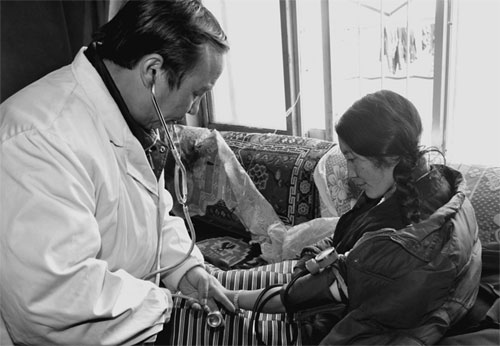Remote regions seek better health care
Dr Tsewang Rigzin, 54, deputy head of the Nagqu People's Hospital in the region's Nagqu prefecture, pays a home visit to a villager who suffers from acute apendicitis. Li Zhou / Xinhua |
Medical services in the Tibet autonomous region have notably improved in recent years, but there is still a big gap between the care available in Tibet and developed provinces, a hospital official and longtime physician said.
Dr Tsewang Rigzin, 54, deputy head of the Nagqu People's Hospital in the region's Nagqu prefecture and a delegate to the National People's Congress, brought proposals to improve remote medical services to the country's top legislative body.
Born in the prefecture's Biru county, Tsewang has worked as a doctor there for 27 years and said he always has the rural people in his heart when he attends the two sessions.
At this session in Beijing, his fourth as a delegate, Tsewang recommended bringing in more medical talent to support medicine in the region.
"We are not lacking advanced equipment, but the talents who actually know how to use the equipment," Tsewang Rigzin. "It is not a gap of equipment, but a gap of talent."
The hospital where he works is located on a grassland where the average altitude is more than 4,500 meters above sea level.
In such a harsh environment, many people find it hard to breathe and keeping medical staff for a length of time is challenging, Tsewang said.
A long-term mechanism is needed to keep skilled medical professionals in remote areas such as at Tibet's high plateau, said Tsewang, a graduate of Tibet Nationality University.
Tsewang's hospital, which has a medical staff of about 200, plans to strengthen staff training, and it has sustainable cooperative projects with big hospitals in other Chinese provinces.
"We plan to have 30 of our doctors trained in the hospitals of the inland provinces of Zhejiang and Liaoning, and these two provinces have projects in our hospital as part of their Tibet-aid projects," he said.
Your Comment
Name E-mailRelated News
-
;
-
-
Subsidies on medical care for Tibetan herdsmen rising
Government subsidies on medical care for Tibetan herdsmen will be increased from 340 to 380 yuan per person per year, rising for the 11th time since 1993, according to xinhuanet.com.
-
-
-
Medical care fact sheet in Tibet: Old vs. New
The peaceful liberation of Tibet in 1951 has served as a dividing line in history marking the dramatic changes taken place in medical care. The white paper issued recently provided substantial information about the sharp contrast in people's health between the Old
-
-
-
Tibetans benefit from improved medical care
When rural doctor Tsering Paljor makes house calls, the journey he has to make to visit patients scattered around the snowy plateaus of Tibet is more dangerous than most.
-
Based in Lhasa, Tibet Vista is a Tibet travel agency that specialized in Tibet permit, and Tibet tours for both private and group travelers at a local price!
•4 Days Lhasa City Group Tour from USD 460 •8 Days Everest Base Camp Group Tour from USD 850 •15 Days Mt.Kailash Group Tour from USD 1780 •2016 Tibet Train Tours from Beijing, Shanghai, Chengdu, Xining,etc











